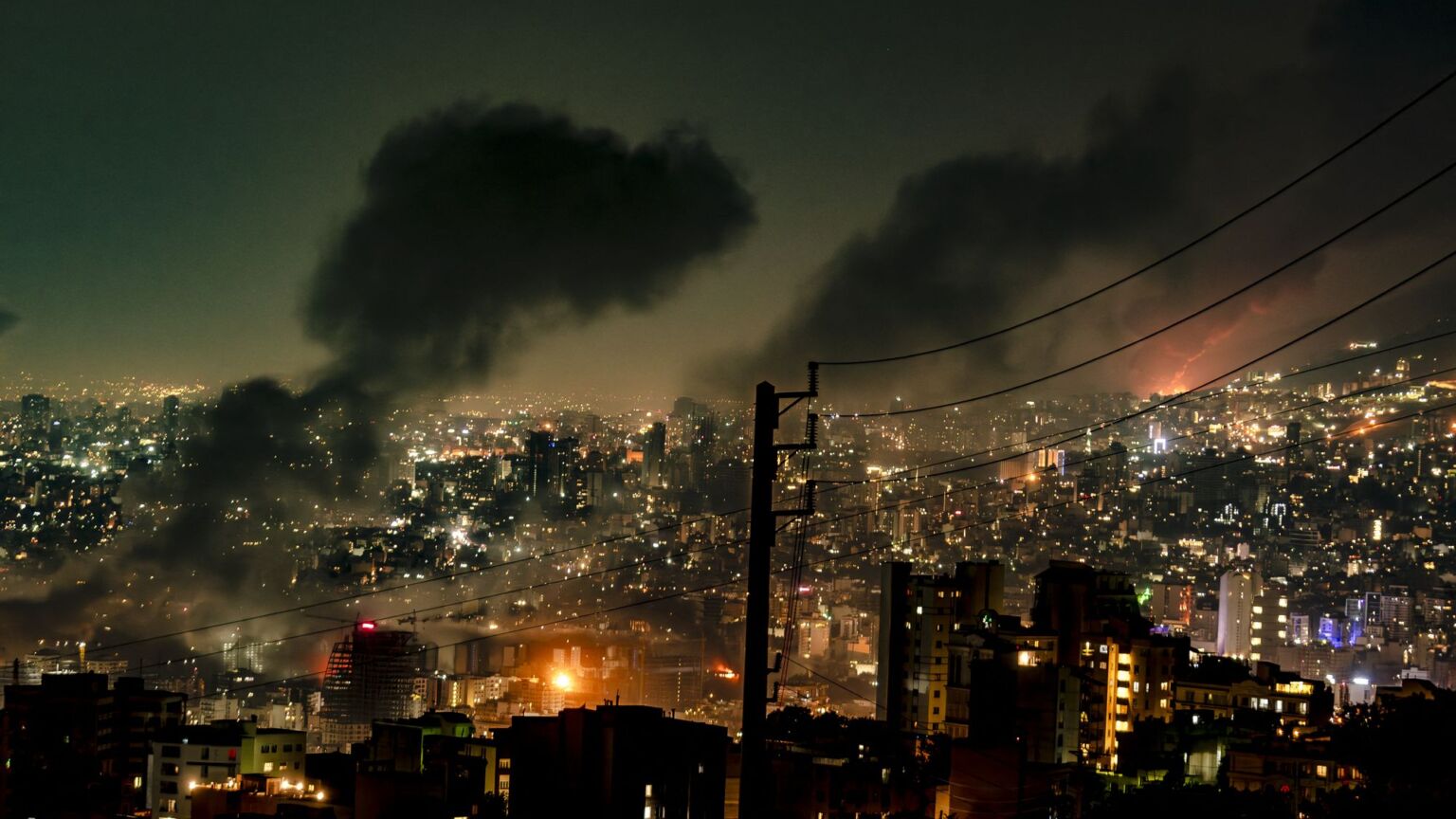Israel’s clash with Iran is nothing like the Iraq War
Both the right and the left are exploiting the disaster of Iraq to try to criminalise the Jewish State.

Want unlimited, ad-free access? Become a spiked supporter.
Remember when Saddam Hussein sponsored an army of fascists that invaded the United States and raped and murdered thousands of Americans? And when he funded a gang of religious fanatics to fire thousands of rockets at people in Leeds and Manchester here in the UK? And when he himself pressed the button on ballistic missiles that landed on New York City and London? No, me neither. Which makes it perplexing that Israel’s push against Iran is being compared to the Iraq War of 2003 – for Iran has done all of that to the Jewish nation, and it dreams of doing more.
The debate about Israel / Iran is at risk of being derailed by disinformation. Gaslighting swirls all around it. This is a crazed stab at ‘regime change’, cry Israel’s critics, and we all know what hellish things spring from ‘regime change’. It is an ‘illegal war’ and a ‘war of aggression’, insists the left. And the trump card: it’s Iraq all over again. Both the digital right and digital left are ‘invoking the spectre of Iraq’, in the words of the New York Times. ‘Welcome to Iraq 2.0’, says the Quincy Institute for Responsible Statecraft. Only worse – Israel’s ‘unprovoked attack’ on Iran has the potential to be ‘far, far more catastrophic’, apparently.
The moral evasion on display here is off the charts. To compare Israel’s fight against its fanatical tormentors in Tehran with America and Britain’s vain and ruinous war on Iraq is to be wilfully blind to both historical truth and moral principle. First, there’s the fact that Saddam’s regime did not attack us. This was a shattered nation, broken by the Iran-Iraq War of the 1980s and the West’s sanctions and bombing raids of the 1990s. In 2003, Iraq barely posed a threat to its neighbours, far less to mighty America or Britain. Washington and London’s depiction of this shell of a regime as a threat to the world was the blackest of black propaganda. It was the lie that unleashed untold horrors.
The Israel-Iran clash is wholly the reverse of this. Iran has attacked Israel ceaselessly and ferociously. Its neo-fascist proxies in Hamas sent a 6,000-strong army into Israel in October 2023 where they raped and murdered hundreds. Its most important proxy – Hezbollah – followed up this pogrom with barrages of missiles into northern Israel. Between Hamas’s pogrom and June of last year, Hezbollah fired 5,000 rockets and other projectiles at Israel. This caused the evacuation of 60,000 people and the deaths of scores of civilians, including 12 Druze kids. Iran itself has directly fired missiles at Israel: 120 ballistic missiles in April 2024; 200 in October 2024.
Casting Israel as the new ‘regime changers’ and Iran as its Iraq-style victim is a ludicrous corruption of truth. This is the black propaganda of this war. The minimisation of the threat posed by Iran to Israel is as gross a fabrication as was the exaggeration of the threat posed by Iraq to the West. Anyone who laments Israel’s strikes on Iran without mentioning what Iran has done to Israel has forfeited the right to be taken seriously on this topic. Their aim is not to enlighten but to obfuscate, to the end of criminalising Israel and absolving the Islamic Republic.
For the Iraq comparison to carry moral weight, Saddam would have had to have attacked the US and the UK – and savagely. In Britain, which has a population of 70million to Israel’s nearly 10million, he would have had to have funded a terror army that slaughtered 8,400 of our people. And sponsored fanatical militants who fired 35,000 rockets at our cities, causing nearly half a million Brits to be displaced. And fired 2,500 of his own missiles directly at our cities. I was implacably opposed to the Iraq War, but if Saddam had visited such horrors on my countrymen I would have supported action against him. I’m an anti-imperialist, not a hippy.
Regionally, too, the Iraq comparison speaks to the ahistoricism of Israel’s critics. The worst thing about the Iraq War is that it was a violent pummelling of a destitute nation. War with Iran, war with Kuwait, war with its own freedom-yearning Kurdish population, war with America, the UN-enforced partition of its lands, the UN’s sanctions that caused chronic hunger and disease – Iraq was a feeble, pathetic half-nation in 2003. ‘Our’ war against it was pure moral pantomime, with well-known deadly consequences.
Iran, by contrast, is an energetic actor in the Middle East. It does pose a strategic threat. It deploys its proxies to the imperial end of extending its theocratic writ across the region. It has fought brutal proxy wars with Saudi Arabia, most notably in Yemen. And it unquestionably menaces Israel. Its missiles and its proxies’ pogroms are testament to that. Iran’s dream – openly – is to eradicate the Jewish State. Which other nation on Earth would be told to chill out in the face of such an extremist neighbour which in both word and deed had made plain its annihilationist aspirations?
The ‘invoking of the spectre of Iraq’ deserves ridicule. If people want to campaign against US or UK assistance for Israel’s war with Iran, that’s their business. I don’t want to see Western boots on the ground in Iran – let the IDF and the mullahs fight this war that Iran started. But the frothing anger with Israel for waging a supposed ‘forever war’, the feverish depiction of Israel’s leaders as modern-day Bushes or Blairs promising the world nothing but catastrophe, smacks of political infantilism. An addiction to the easy anti-war positions of the 2000s has blinded people to the moral and even civilisational questions raised by the multi-pronged Islamist effort to destroy the Jewish State.
Israel’s critics see themselves as being on the side of peace. Really? In railing against Israel for striking back against the regime that has visited extreme violence on its people, they are essentially instructing the Jewish State to live meekly alongside an existential hazard. They want to maintain a status quo ante in which the permanent threat of annihilation hangs over Israel. They see the existential endangerment of the Jews of Israel as a small price to pay for their own peace of mind. That isn’t ‘peace’ – it’s the displacement of war on to the Jews in order to save non-Jews’ arses.
It’s understandable that Iraq gave rise to a new isolationism. But it’s clear now that concern about that war has curdled into a deep and fretful cynicism where military action of any kind is viewed suspiciously. The role of the ‘Iraq spectre’ in public life is less to promote a principled opposition to Western interference in the affairs of other states than to institutionalise a politics of precaution in which every nation is encouraged to batten down the hatches lest ‘another Iraq’ occur. Between this nervous isolationism and the imperial hubris of those who smashed Iraq, there’s something else: internationalism, a support for democratic liberation everywhere. Israel has a right to defend itself against anti-Semitic tyrants, and Iranians have the right to choose who rules them – those are my uneasy positions.
Brendan O’Neill is spiked’s chief political writer and host of the spiked podcast, The Brendan O’Neill Show. Subscribe to the podcast here. His new book – After the Pogrom: 7 October, Israel and the Crisis of Civilisation – is available to order on Amazon UK and Amazon US now. And find Brendan on Instagram: @burntoakboy
£1 a month for 3 months
You’ve hit your monthly free article limit.
Support spiked and get unlimited access.
Support spiked – £1 a month for 3 months
spiked is funded by readers like you. Only 0.1% of regular readers currently support us. If just 1% did, we could grow our team and step up the fight for free speech and democracy.
Become a spiked supporter and enjoy unlimited, ad-free access, bonus content and exclusive events – while helping to keep independent journalism alive.
———————————————————————————————————————————–
Exclusive January offer: join today for £1 a month for 3 months. Then £5 a month, cancel anytime.
———————————————————————————————————————————–
Monthly support makes the biggest difference. Thank you.











Comments
Want to join the conversation?
Only spiked supporters and patrons, who donate regularly to us, can comment on our articles.